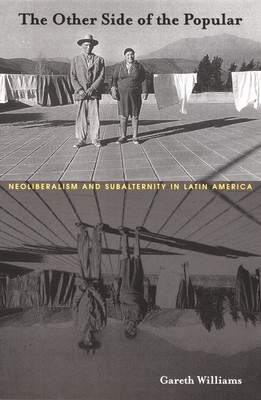
- We will send in 10–14 business days.
- Author: Gareth Williams
- Publisher: Duke University Press
- ISBN-10: 0822329417
- ISBN-13: 9780822329411
- Format: 15.9 x 23.6 x 2.5 cm, minkšti viršeliai
- Language: English
- SAVE -10% with code: EXTRA
Reviews
Description
Drawing on deconstruction, postcolonial theory, cultural studies, and subaltern studies, The Other Side of the Popular is as much a reflection on the limitations and possibilities for thinking about the politics of Latin American culture as it is a study of the culture itself. Gareth Williams pays particular attention to the close relationship between complex cultural shifts and the development of the neoliberal nation-state. The modern Latin American nation, he argues, was built upon the idea of "the people," a citizenry with common interests transcending demographic and cultural differences. As nations have weakened in relation to the global economy, this moment-of the popular as the basis of nation-building-has passed, causing seismic shifts in the relationships between governments and cultural formations. Williams asserts that these changed relationships necessitate the rethinking of fundamental concepts such as "the popular" and "the nation." He maintains that the perspective of subalternity is vital to this theoretical project because it demands the reimagining of the connections between critical reason and its objects of analysis.
Williams develops his argument through studies of events highlighting Latin America's uneasy, and often violent, transition to late capitalism over the past thirty years. He looks at the Chiapas rebellion in Mexico, genocide in El Salvador, the Sendero in Peru, Chile's and Argentina's transitions to democratic governments, and Latin Americans' migration northward. Williams also reads film, photography, and literary works, including Ricardo Piglia's The Absent City and the statements of a young Salvadoran woman, the daughter of ex-guerrilleros, living in South Central Los Angeles.
The Other Side of the Popular is an incisive interpretation of Latin American culture and politics over the last few decades as well as a thoughtful meditation on the state of Latin American cultural studies.
EXTRA 10 % discount with code: EXTRA
The promotion ends in 23d.12:28:47
The discount code is valid when purchasing from 10 €. Discounts do not stack.
- Author: Gareth Williams
- Publisher: Duke University Press
- ISBN-10: 0822329417
- ISBN-13: 9780822329411
- Format: 15.9 x 23.6 x 2.5 cm, minkšti viršeliai
- Language: English English
Drawing on deconstruction, postcolonial theory, cultural studies, and subaltern studies, The Other Side of the Popular is as much a reflection on the limitations and possibilities for thinking about the politics of Latin American culture as it is a study of the culture itself. Gareth Williams pays particular attention to the close relationship between complex cultural shifts and the development of the neoliberal nation-state. The modern Latin American nation, he argues, was built upon the idea of "the people," a citizenry with common interests transcending demographic and cultural differences. As nations have weakened in relation to the global economy, this moment-of the popular as the basis of nation-building-has passed, causing seismic shifts in the relationships between governments and cultural formations. Williams asserts that these changed relationships necessitate the rethinking of fundamental concepts such as "the popular" and "the nation." He maintains that the perspective of subalternity is vital to this theoretical project because it demands the reimagining of the connections between critical reason and its objects of analysis.
Williams develops his argument through studies of events highlighting Latin America's uneasy, and often violent, transition to late capitalism over the past thirty years. He looks at the Chiapas rebellion in Mexico, genocide in El Salvador, the Sendero in Peru, Chile's and Argentina's transitions to democratic governments, and Latin Americans' migration northward. Williams also reads film, photography, and literary works, including Ricardo Piglia's The Absent City and the statements of a young Salvadoran woman, the daughter of ex-guerrilleros, living in South Central Los Angeles.
The Other Side of the Popular is an incisive interpretation of Latin American culture and politics over the last few decades as well as a thoughtful meditation on the state of Latin American cultural studies.


Reviews